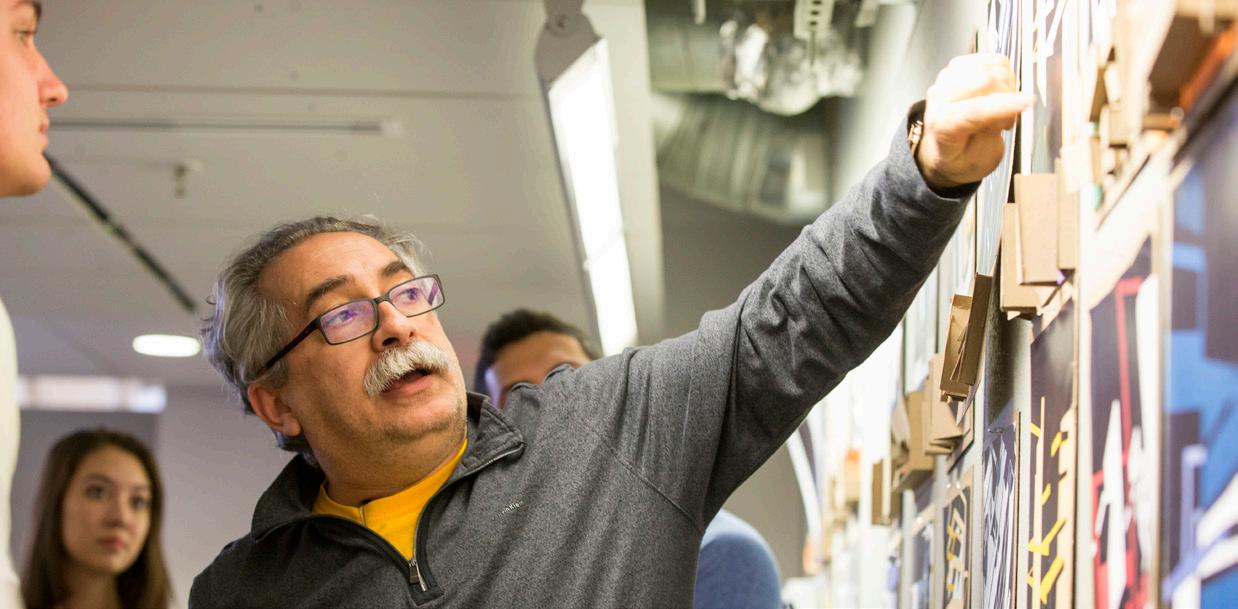
4 minute read
Learning & Teaching Culture
The Learning & Teaching Culture Policy outlined herewith is an agreement between all students and faculty in the Oklahoma State University School of Architecture, and was created in order to assure a positive and healthy academic, social and professional environment within the unique culture of the School of Architecture. This Policy represents a cultural change and conservation agreement, and does not constitute official University policy. The basis and power of this Policy lies in action and discussion; it represents a set of values and goals, and the actions necessary to achieve them.
Education The educational experience of the OSU School of Architecture is as unique and rewarding as it is intensive and time-consuming. As such, the Architecture and Architectural Engineering curriculums require open and honest communication between students and faculty about progress, quality and grades to ensure a basis for development and advancement. The educational culture of the School of Architecture functions on a balance of collaboration and healthy competition. Students and faculty are expected to share with and aid others in the process of becoming better designers; collaboration not only between students and faculty but also between different disciplines serves to create well-rounded students and professionals. Simultaneously, competition within the School is used as a tool for motivation and advancement, though collaboration and camraderie within competitions is welcome and encouraged. Students are encouraged to learn through exploration of many ideas and processes, guided by the experience of their professors. Important
Advertisement
components of design education are learned and taught outside of the design studio, and as such it is expected that students and faculty will place equal importance on all courses and educational experiences, both inside and outside the School of Architecture. It is acknowledged that education outside of the School of Architecture both during a student’s college career and after their graduation is important, and students and faculty should understand that the learning process in a design field never stops. The students and faculty of the School of Architecture will tolerate no violation of the University’s Academic Integrity Policy, including wrongful appropriation of a creative work or design.
Health & Wellness The intensive nature of university education and the curriculum of the School of Architecture require that students maintain healthy lifetyle habits to succeed. These include healthy sleeping, eating and social habits, as well as habits to facilitate overall well-being. The School of Architecture, its faculty and its students will continue to place great importance on a healthy lifestyle throughout the educational process, and all are expected to spread and teach healthy habits while discouraging unhealthy ones. Time management is a large part of maintaining healthy habits, and will be taught, encouraged and facilitated by faculty and students. It is well-known that education and life in general can often be overwhelming. Support for students will be offered whenever possible and prudent in the interest of maintaining physical and mental health. It is also acknowledged that education can be financially taxing; students and faculty should strive to
◄ Students working in first-year studio
communicate openly about financial requirements and strain, and whenever possible this strain should be minimized so that focus and intention can remain on education and learning.
Social Environment The community of the School of Architecture is of paramount importance to the growth and development of students and faculty as individuals and the school as a whole. Students and faculty are encouraged and expected not only to participate in this community through interpersonal relationships, school events, school organizations and other community efforts, but to facilitate its maintenance and growth. In a community as unique and close-knit the School of Architecture, mutual respect is the difference between a constructive or toxic culture. No disrespect, discrimination or persecution based on any form of diversity will be tolerated within the School. The School of Architecture encourages and facilitates mentorship at the student, faculty and professional levels. Healthy relationships with knowledgeable mentors is an important part of educational and professional development, and while programs are in place for the creation and facilitation of mentor-mentee relationships, each student is encouraged to find a mentor in their own way. Faculty can serve as knowledgeable and helpful mentors, and the School of Architecture prides itself on the close and healthy relationships between students and faculty.
Physical Environment As a direct result of the nature of architectural education the design studios and other spaces within the School of Architecture are heavily inhabited and utilized. In accordance with this usage students are expected to keep all spaces within the School as clean as possible, and strive to respect the boundaries and space of their peers. Students are free to inhabit and utilize the studio in any way, unless this freedom negatively affects those around them or the educational goals of the School. During their time working and creating in the School of Architecture students and faculty are expected to be mindful of safety and sustainability. Safe and environmentally responsible practices, both for the educational process and the profession, will be taught and utilized at the School of Architecture to ensure a positive and healthy future for our graduates and for the planet.
Policy The cultural potential of this policy lies in discussion and action, not in the policy itself. With that in mind the policy will be analyzed, rewritten, presented and discussed on a regular basis. The governance of this policy can be found in the complete version, referenced at the start of this version, as well as the endorsement signatures of student leaders and school administration.
Please see your academic advisor for the full version.
▼ Professor Bilbeisi welcoming Comprehensive Studio






